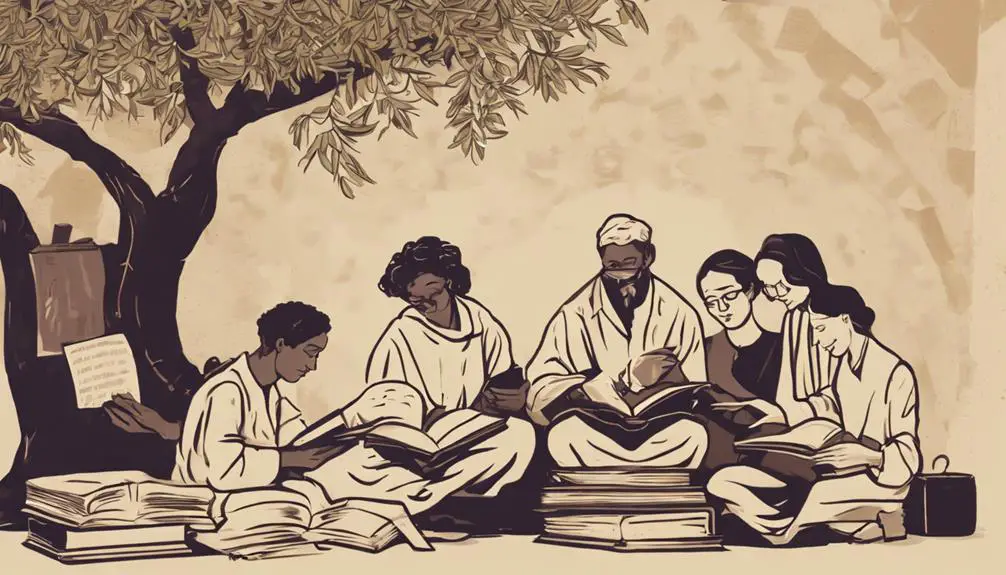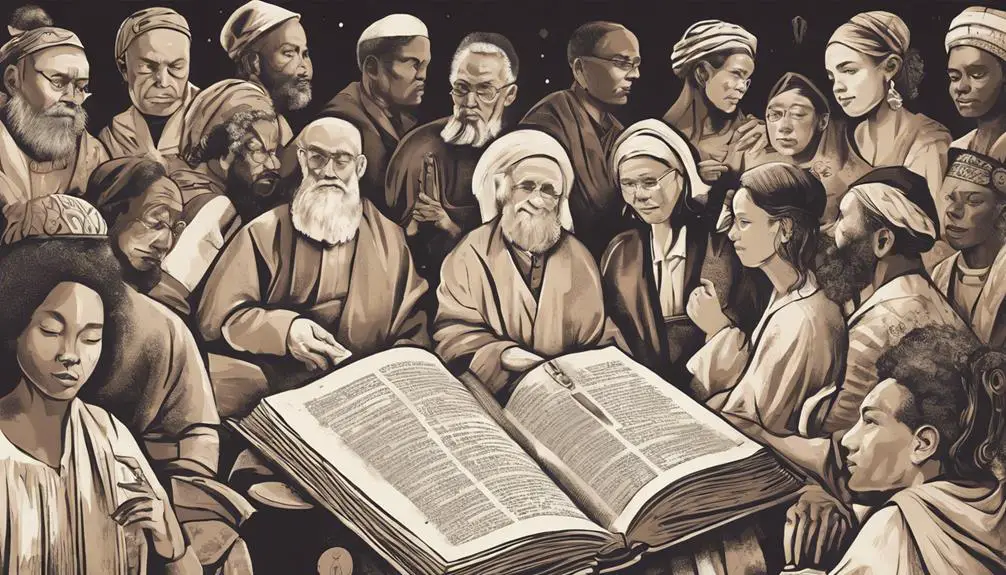Open your mind to 10 compelling reasons why the Bible's historical accuracy and timeless wisdom make it a must-read for skeptics and believers alike.

10 Reasons to Believe in the Bible
You've heard the debates, encountered the skeptics, and perhaps even questioned yourself: Why believe in the Bible?
It's not just a book of ancient stories; it's a tome of historical accuracy, fulfilled prophecies, and timeless moral principles that have stood the test of centuries.
As you consider its influence on civilization and unique structure, you might find yourself intrigued by the depth and breadth of evidence supporting its authenticity.
But there's more to its story, elements that might just shift your perspective and invite you into a deeper exploration of its pages.
Key Takeaways
- Archaeological evidence and manuscript tradition bolster the Bible's historical accuracy.
- Specific prophecies within the Bible have been fulfilled, demonstrating its predictive power.
- The Bible's core messages have remained stable over centuries despite diverse authorship.
- Its profound influence on civilization reflects the Bible's enduring relevance and impact.
Historical Accuracy Verified

Numerous archaeological discoveries have consistently corroborated the historical events and figures mentioned in the Bible, reinforcing its credibility as a historical document. You might find it intriguing how the manuscript tradition of the Bible, spanning centuries, plays a crucial role in this verification process. Scholars painstakingly compare thousands of ancient texts to ensure the accuracy of modern translations. This rigorous method highlights the Bible's unique preservation over time, unlike any other ancient text.
Moreover, the translation challenges faced by scholars aren't trivial. Each ancient manuscript contains variations that must be carefully analyzed to discern the most accurate rendering of the original texts. You'd be fascinated to know that despite these challenges, the core messages and historical accounts within the Bible have remained remarkably consistent through various translations. This consistency is a testament to the meticulous care taken in preserving the Bible's authenticity and reliability as a historical record.
It's important to approach this topic with a balanced perspective. While the historical accuracy verified through archaeological findings and the robust manuscript tradition strongly supports the Bible's credibility, it's also crucial to recognize the complexities involved in translating ancient texts. These efforts underscore the dedication to maintaining the integrity of the Bible, further compelling you to appreciate its historical significance. The convergence of historical evidence with the painstaking efforts in manuscript preservation and translation underscores a compelling narrative of the Bible's enduring reliability and its profound impact on understanding the past.
Fulfilled Prophecies

Beyond the historical accuracy and meticulous preservation of the Bible, its credibility is further bolstered by the fulfillment of prophecies recorded within its pages. You might wonder how prophecies can serve as a testament to the Bible's divine inspiration. Consider the following aspects that highlight the significance of fulfilled prophecies:
- Prophecy specificity: The Bible contains prophecies with specific details regarding events, places, and people that were fulfilled centuries later. This specificity reduces the likelihood of coincidental fulfillment and underscores the prophetic accuracy.
- Historical validation: Many of the prophecies recorded have been validated by historical events. For instance, the foretelling of the rise and fall of empires and the detailed predictions about the life and death of Jesus Christ are well-documented.
- Interpretation challenges: While the fulfillment of some prophecies is starkly evident, others require a nuanced understanding of historical and cultural contexts for accurate interpretation. This complexity adds depth to the study of biblical prophecies and invites rigorous scholarly examination.
- Predictive versus reactive prophecy: The Bible contains instances of predictive prophecy, which foretell events before they happen, as opposed to reactive prophecy, which offers interpretations or explanations after events have occurred. This predictive element is key to understanding the Bible's prophetic significance.
The fulfillment of biblical prophecies is a compelling reason to explore the Bible's claims of divine inspiration. Despite interpretation challenges, the specificity and historical validation of these prophecies offer a fascinating glimpse into the accuracy and reliability of the biblical narrative.
Consistency Across Centuries

The remarkable consistency of the Bible's message, maintained over centuries of transmission, invites you to consider its unparalleled cohesiveness and reliability. Despite the myriad of translation variations and the vast manuscript diversity, the core narratives and doctrines have remained astonishingly stable. This feat is even more impressive when you take into account the Bible's compilation over approximately 1,500 years by over 40 authors from diverse cultural and historical contexts.
Consider the challenge of preserving a document's integrity over such an extended period, especially one as widely circulated and scrutinized as the Bible. The potential for alteration, whether intentional or accidental, was immense. Yet, the Bible's fundamental teachings have navigated these turbulent waters with an integrity that's hard to dispute.
Translation variations, often cited by skeptics as evidence of inconsistency, actually underscore the meticulous care with which scholars approach the Bible's transmission. These variations are typically minor and don't affect the central messages of the text. In fact, they offer a window into the precision and reverence translators hold for these sacred texts.
Manuscript diversity, rather than undermining the Bible's reliability, serves as a testament to its enduring influence and the care taken to preserve its message across generations. The sheer volume of manuscripts, unparalleled in ancient literature, allows scholars to cross-reference and verify the accuracy of the texts we've today.
In analyzing the Bible's consistency across centuries, you're not just encountering a religious text but a historical document that has withstood the tests of time, criticism, and cultural change with remarkable resilience. This steadfastness invites deeper reflection on the Bible's significance and its claims of divine inspiration.
Scientific Foreknowledge

Several passages within the Bible have intrigued scholars and believers alike for their apparent anticipation of modern scientific discoveries. You might find it compelling how ancient texts could hint at concepts that seem to align with what we understand today through the lens of advanced science. This intersection between scripture and science offers a unique perspective on the Bible's relevance in the contemporary world.
- Genetic Complexity: The Bible's references to the intricacies of life and human creation have led some to draw parallels with our current understanding of DNA and genetic complexity. You'd see how the scripture's portrayal of life's design could be seen as an early nod to the complexity that modern genetics has unveiled.
- Hygienic Practices: Long before germ theory, biblical laws on cleanliness and quarantine reflected a profound understanding of health practices that align surprisingly well with modern public health principles.
- Astronomy: Biblical passages describing the vastness of the universe and the number of stars have been interpreted by some as anticipating the vast scales involved in modern astronomy.
- Quantum Physics: Though more abstract, the descriptions of the fundamental nature of reality in certain biblical texts have intrigued some as potentially hinting at the principles of quantum physics, with its emphasis on the probability and interconnectedness of all things.
In analyzing these aspects, it's essential to approach the Bible with both respect and a critical mind. The potential alignment of its passages with modern science invites a deeper exploration of its texts, encouraging a dialogue between faith and reason that enriches our understanding of both.
Influence on Civilization

Throughout history, you'll find that the Bible has significantly shaped the development of civilizations, influencing aspects ranging from legal systems to cultural norms. This profound impact isn't merely a testament to the Bible's spiritual significance but also to its role in the ethical evolution and cultural adaptation of societies worldwide. The text's teachings have informed the moral compass of individuals and nations, guiding decisions in governance, justice, and interpersonal relationships.
You must recognize how the Bible's narratives, principles, and commandments have been integrated into the fabric of legal systems. Many modern laws find their roots in biblical commandments, emphasizing justice, equality, and compassion. This intersection of divine instruction and human law showcases the Bible's enduring influence on societal structures and ethical standards.
Moreover, the Bible's contribution to cultural adaptation is undeniable. As it spread across continents, its stories and teachings were integrated into diverse cultures, enriching traditions and inspiring art, literature, and music. This cultural infusion hasn't only fostered a sense of shared humanity but has also encouraged societies to reflect on their values and behaviors, promoting ethical evolution.
In analyzing the Bible's influence on civilization, it's clear that its impact extends beyond religious boundaries. Its teachings have catalyzed significant changes in societal norms and legal practices, underscoring the interconnectedness of faith, culture, and ethics. As you delve deeper into the Bible's history and teachings, you'll uncover the layers of its contribution to the development of civilizations, highlighting its role in shaping the moral and cultural landscapes of our world.
Changed Lives and Testimonies

Countless individuals have experienced profound transformations in their lives through encounters with the Bible's teachings, offering powerful testimonies to its enduring relevance and impact. These narratives aren't just anecdotal; they're grounded in the profound personal transformation and spiritual experiences that people from diverse backgrounds share. You might wonder how these changes manifest and what makes them so convincing as reasons to believe in the Bible.
- Shifts in Moral and Ethical Perspectives: Many report a radical realignment of their moral compass after engaging with biblical teachings, leading to changes in behavior and attitudes towards others.
- Overcoming Personal Struggles: Testimonies often include accounts of overcoming addiction, depression, and other life-controlling issues, attributed to the strength and guidance found within the Bible's pages.
- Development of a Purpose-Driven Life: Individuals recount discovering a sense of purpose and direction that was previously absent, attributing this newfound clarity to their engagement with biblical principles.
- Strengthened Relationships: Testimonies frequently highlight restored and strengthened relationships with family, friends, and communities as a direct result of applying biblical teachings on forgiveness, love, and reconciliation.
Analyzing these testimonials, it's evident that the Bible's influence extends beyond mere spiritual enlightenment; it catalyzes a holistic personal transformation that impacts every facet of an individual's life. This transformation isn't limited by cultural, social, or economic boundaries, underscoring the Bible's universal appeal and power. As you consider the evidence, it's clear that the changed lives and testimonies of countless individuals stand as a compelling testament to the Bible's transformative power and its ongoing relevance in today's world.
Unique Structure and Unity

Spanning centuries of history and composed by various authors, the Bible's cohesive narrative and unified structure stand as a testament to its divine inspiration and enduring message. Despite the passage of time and the diversity of its contributors, it maintains a singular vision that has intrigued scholars and believers alike. This unique composition isn't just happenstance; it's a reflection of a meticulously structured message that transcends cultural and historical contexts.
Diving deeper, you'll find the Bible encompasses an array of literary genres, from poetry and prophecy to historical narratives and letters. This variety could easily lead to a disjointed collection of texts. However, the Bible, with its complex layers of meaning and rich tapestry of themes, achieves a remarkable unity. Each book, while distinct in style and perspective, contributes to a coherent story of human existence, divine intervention, and the promise of redemption.
The author diversity is equally compelling. The Bible wasn't penned by a single individual in a secluded time frame but was written across continents over approximately 1,500 years by people from various walks of life. From shepherds and kings to prophets and fishermen, each author brought a unique viewpoint to the overarching narrative. Yet, despite their differences, there's a harmonious alignment in their messages, pointing to a shared source of inspiration.
This unity, against the backdrop of such diversity, doesn't just suggest a higher level of coordination. It invites you to consider the Bible not merely as a historical document or literary masterpiece, but as a revelation of a singular, purposeful message intended for all humanity.
Survival Against Persecution

Despite numerous attempts to suppress or eradicate its teachings, the Bible has demonstrated remarkable resilience, continuing to influence millions worldwide. This survival against persecution isn't just a testament to its spiritual significance but also an intriguing subject of study in understanding censorship dynamics and martyrdom psychology.
You might wonder, how has the Bible withstood centuries of challenges to its existence?
- Historical Persecutions: From ancient empires to modern totalitarian regimes, the Bible has faced deliberate attempts at destruction. Yet, it hasn't only survived but flourished, as if each attempt to quell its voice only made it louder and more widespread.
- Censorship Dynamics: The efforts to censor the Bible have often backfired, sparking curiosity and leading to increased clandestine distribution. The psychology behind this phenomenon suggests that suppression incites a deeper desire to uncover the forbidden, thereby amplifying the Bible's reach.
- Martyrdom Psychology: The willingness of early Christians to face persecution and even death for their faith has been a powerful testament to their belief in the Bible's teachings. This legacy of martyrdom has inspired generations, reinforcing the Bible's influence and its perceived worthiness of such sacrifice.
- Adaptability and Translation: The Bible's ability to adapt to different cultures and languages has played a crucial role in its survival. Its translations have made it accessible to diverse populations, further complicating efforts to suppress it.
The Bible's journey through history is a compelling narrative of resilience. Its survival against persecution not only underscores its spiritual and cultural significance but also embodies a fascinating interplay of human psychology and societal dynamics.
Archaeological Corroboration

ARTICLE TITLE: Reasons to Believe in the Bible
PREVIOUS SUBTOPIC: 'Survival Against Persecution'
CURRENT SUBTOPIC: 'Archaeological Corroboration'
Numerous archaeological discoveries have provided tangible evidence supporting the historical accuracy of various events, places, and figures described in the Bible. You'll find that these findings not only corroborate biblical narratives but also offer a deeper understanding of the cultural contexts within which these stories unfolded. The artifact origins range from ancient inscriptions to monumental architecture, each contributing a piece to the historical puzzle.
Discovery |
Significance |
|---|---|
Dead Sea Scrolls |
Contain texts of the Hebrew Bible, dating back to the 2nd century BCE, validating the text's ancient origins. |
Pool of Bethesda |
Described in the Gospel of John, this site was excavated in Jerusalem, confirming its historical existence and use. |
House of David Inscription |
First historical evidence of King David outside the Bible, found in the Tel Dan Stele, affirming the biblical narrative. |
Cyrus Cylinder |
Corroborates the biblical account of Cyrus the Great's decree allowing Jews to return to Israel, reflecting the accuracy of biblical history. |
These archaeological finds do not just stand as mere historical artifacts; they are a testament to the Bible's deep-seated roots in real historical events and settings. They serve as a bridge connecting the ancient texts to the tangible, physical world, offering you a lens through which to view the biblical stories within their true cultural and historical frameworks. This archaeological corroboration encourages a nuanced appreciation of the Bible, beyond its spiritual teachings, as a document of historical significance.
Timeless Moral Principles

Throughout history, the Bible has consistently offered timeless moral principles that resonate with individuals across various cultures and generations. Its ethical teachings and moral guidelines have provided a foundation for understanding right from wrong, transcending the ever-changing landscapes of cultural relativity and modern ethics. The Bible's moral principles aren't just historical artifacts; they're living, breathing guidelines that continue to influence and guide billions of people in their daily lives.
- The Golden Rule: Treat others as you'd like to be treated. This principle transcends cultural and historical boundaries, emphasizing empathy and mutual respect.
- The Value of Truth: Honesty and integrity are championed in the Bible, principles that remain crucial in maintaining trust and harmony in any society.
- The Importance of Justice: Fairness and justice are core to the Bible's teachings, advocating for a society where everyone is held to the same standard.
- Compassion for the Less Fortunate: The call to care for the needy, the sick, and the marginalized is a recurring theme, highlighting a universal moral obligation towards altruism.
These principles challenge you to consider the implications of your actions in a broader societal context, beyond personal or immediate gains. In a world grappling with moral relativism and the complexities of modern ethics, the Bible's timeless moral principles offer a stabilizing anchor, encouraging a return to fundamental human values. This isn't to say that interpreting these principles doesn't require thoughtful reflection, especially in light of cultural relativity, but their enduring presence in ethical discussions underscores their significance in shaping moral conduct across ages.
Frequently Asked Questions
How Does the Bible Address Modern Ethical Dilemmas Such as Artificial Intelligence, Genetic Engineering, and Climate Change?
The Bible doesn't explicitly address modern issues like artificial intelligence, genetic engineering, or climate change. However, it sets principles of technological morality and ethical stewardship that can guide your decisions.
By emphasizing love, respect for creation, and responsibility towards future generations, you're encouraged to consider the broader implications of your actions.
Thus, it offers a moral compass for navigating these complex dilemmas, encouraging thoughtful reflection on the ethical considerations of advancing technology.
In What Ways Does the Bible Interact With or Acknowledge Other Contemporary Religious Texts and Beliefs Outside of Judaism and Christianity?
You'll find the Bible interacts with contemporary religious texts and beliefs through references and parallels to ancient myths, highlighting a rich cultural exchange.
It doesn't directly acknowledge these texts in the way modern authors might cite sources, but its narratives reflect a deep awareness of surrounding cultures.
This intertextuality suggests that biblical authors engaged thoughtfully with the religious and philosophical ideas circulating in their broader cultural milieu, respecting and sometimes integrating these external influences.
How Does the Concept of Free Will Reconcile With the Biblical Narrative of Predestination and God's Omniscience?
You're diving into a complex issue: how divine foreknowledge, human choice, and predestination coexist in the Bible.
It's a balancing act, really. The Bible presents God as all-knowing, yet it doesn't dismiss our capacity to choose.
This duality suggests that, while God might know the outcome of every decision, your choices aren't meaningless. They're part of a larger tapestry, woven with both freedom and a divine plan.
Can the Bible's Teachings Be Adapted to Support Inclusivity and Acceptance of Lgbtq+ Individuals Within Religious Communities?
Absolutely, the Bible's teachings can evolve through scriptural reinterpretation, acknowledging its historical context. By examining the scriptures with a contemporary lens, you'll find that inclusivity and acceptance of LGBTQ+ individuals aren't just possible; they're essential for a compassionate religious community.
This approach doesn't undermine the Bible's core values but instead deepens our understanding, allowing faith to embrace everyone, regardless of their sexual orientation or gender identity.
How Do Biblical Interpretations Vary Across Different Christian Denominations, and What Impact Does This Have on the Unity of the Faith?
Biblical interpretations vary significantly across Christian denominations, deeply rooted in the concepts of Scriptural Authority and Denominational Diversity. This variation impacts the unity of the faith, as each group emphasizes different aspects of the Scripture based on their theological perspectives.
While some see this diversity as enriching, others view it as a challenge to unity. Understanding these differences is key to fostering a respectful dialogue within the broader Christian community.
Conclusion
In your quest for truth, you've journeyed through history, prophecy, science, and morality, all converging in the Bible's pages. Its enduring influence, unbroken consistency, and verified accuracy challenge scepticism at its core.
As you stand at this crossroads, consider the Bible's unparalleled survival and unity. Isn't it compelling, perhaps even mysterious, how such a book has shaped civilization?
The evidence invites a deeper exploration, urging you to ponder its significance in your life. The answer, it seems, is just a page away.



Sign up